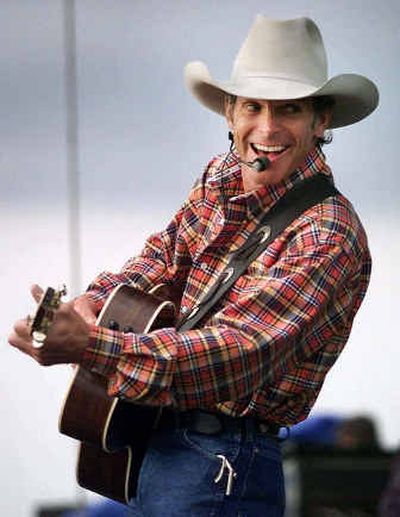Bronc-riding singer Chris LeDoux dies

Chris LeDoux, a champion rodeo rider who achieved greater fame writing and singing songs about the rodeo life, died Wednesday of cancer in Casper, Wyo. He was 56.
LeDoux recorded more than 35 albums and sold more than 6 million in his 32-year career. He received a significant career boost in 1989 from country star Garth Brooks, whose hit “Much Too Young (To Feel This Damn Old)” included a line about the singer: “A worn-out tape of Chris LeDoux, lonely women and bad booze seem to be the only friends I’ve left at all.”
The song focused attention on LeDoux, and before long he signed with Capitol Nashville Records. He was a presence on the country charts throughout the ‘90s and had a Top 10 hit in 1992 with “Whatcha Gonna Do With a Cowboy,” a duet with Brooks that received a Grammy nomination.
Then Anaheim Angel baseball fans became familiar with LeDoux’s “Cowboys Like a Little Rock & Roll” when slugger Troy Glaus adopted it as his at-bat theme song.
LeDoux’s celebrity and record sales were based on his stature in the cowboy culture, not on songs tailored for country radio. LeDoux turned his observations of the tough rodeo lifestyle into reflections and vignettes that resonated strongly with his peers. His lyrics tended to be romanticized but had a vivid realism that stemmed from his firsthand experience.
“They like the music because it’s real,” LeDoux said of his fans in a 1992 interview with the Los Angeles Times. “For me, it’s got to be real. That’s all I’ve known my whole life … just the gut-level living in the dirt and the sweat and the blood.”
LeDoux was born in Biloxi, Miss., and moved frequently as a child with his family. He went to Wyoming as a teenager and began competing in rodeos. He started writing songs about his experiences, which got good reactions when he sang them at motel-room parties after the rodeo, or during long drives to the next competition.
He recorded his first album, “Songs of the Rodeo Life,” in 1972 in a basement in Sheridan, Wyo., with a highway patrolman playing bass and a rancher on lead guitar. He sold the cassettes out of the back of his van at rodeos, but his audience grew, and soon he was making an album a year.
His parents formed a record label and acted as his managers. They bought the equipment to turn out 8-track cartridges at their Nashville, Tenn.-area home, gluing the labels on by hand.
His father, Al, produced the records and wrote mail-order ads in the form of stories about the West, and placed them in such magazines as Rodeo Sports News, Hoof and Horns, Rodeo News and Western Horseman. They got the albums into Western shops and feed stores. Al LeDoux once estimated that the family earned $4 million from their record sales. Capitol’s Liberty label reissued all 22 albums on compact disc after LeDoux joined the company.
While his music was prospering, LeDoux also excelled at his first love, becoming the Professional Rodeo Cowboys Association’s bareback riding champion in 1976. But after he tore up a knee in Houston’s Astrodome, hyper-extended an elbow in Denver and jerked loose a collarbone in Phoenix, he eased out of rodeo competition to focus on the music and his 500-acre ranch in Kaycee, Wyo.
LeDoux, whose last album of new material was “Horsepower” in 2003, had suffered from health problems in recent years. He underwent a liver transplant in 2000, and he was diagnosed with cancer last year.
He is survived by his wife, Peggy, and five children: Clay, Ned, Will, Beau and Cindi.